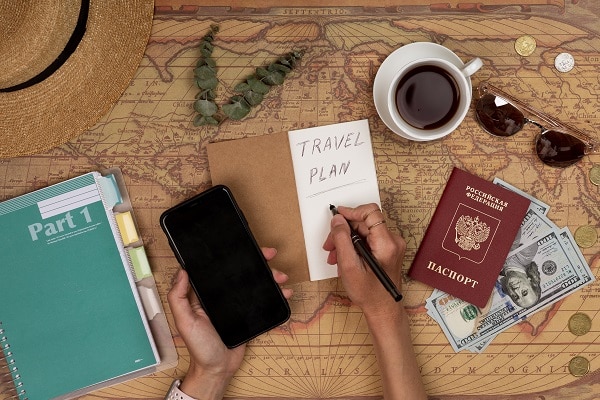Traveling can often feel like a luxury reserved for those with fat wallets. The perception that exploring new places and cultures is expensive can make many would-be travelers hesitate to pack their bags. But what if it’s possible to have an incredible travel experience without draining one’s bank account? This article aims to debunk the myths surrounding the cost of travel and provides practical tips for affordable adventures. From finding budget-friendly accommodations to enjoying low-cost or free activities, this guide covers all the secrets to making your travel dreams come true without breaking the bank.
Contents
Why Expensive Travel Isn’t Always Better

The idea that luxury equates to a better travel experience is a misconception that many fall prey to. Five-star hotels, fine dining, and private tours may offer comfort and convenience but have a hefty price tag. Moreover, such opulence can create a bubble that isolates travelers from the real essence of a destination. An expensive travel itinerary might make for great Instagram photos, but it often lacks the elements that enrich travel.
Another angle to consider is that budget travel often allows for a more authentic experience. Staying in hostels or local guesthouses, using public transport, and eating at local markets can offer a window into the daily life of a destination that luxury travel seldom provides. Contrary to popular belief, traveling on a budget doesn’t mean sacrificing quality; it just involves different priorities that focus on experience over extravagance.
Planning is Half the Battle

Researching a destination thoroughly before finalizing any travel plans is key to a budget-friendly trip. From the average cost of accommodations to local transportation, understanding the financial aspects of a destination can help you set a realistic budget. It’s crucial to compare various travel destinations and choose one that offers a range of affordable activities, lodging, and food options.
Timing your travel right can also save you a substantial amount of money. Tourist destinations are often most expensive during peak seasons, when flights, accommodations, and even local goods can be marked up significantly. Traveling during the off-season or shoulder season allows you to avoid crowds and helps you take advantage of lower prices and special offers.
Budget-Friendly Accommodations

One of the largest expenses during travel is accommodation. Hotels in touristy areas can be outrageously expensive and often don’t offer a local experience. Hostels and homestays, on the other hand, offer a much more budget-friendly and culturally enriching alternative. Not only do they provide a place to sleep, but they also offer a unique opportunity to meet and interact with other travelers and locals.
Today, technology makes it easier than ever to find affordable lodging. Platforms like Airbnb, Booking.com, and various hostel-booking apps allow travelers to compare prices, read reviews, and negotiate deals. Alerts can also be set for price drops, ensuring you get the best bang for your buck.
Eating Well Without Breaking the Bank

One of the greatest pleasures of travel is the chance to try new foods and flavors. However, dining in restaurants, especially touristy areas, can quickly add up. Instead, consider shopping at local markets, which allow for a more intimate look at the local culture and provide a plethora of fresh, affordable ingredients. Preparing your meals can save a substantial amount of money and also create memorable travel experiences.
Another way to save on food is to avoid restaurants in tourist-heavy areas. These establishments often mark up their prices significantly. Opt for local eateries, food trucks, or street vendors instead. Many cities also have food halls or public markets offering various options at reasonable prices. Social media and food blogs can be excellent resources for finding these hidden gems.
Affordable Transportation

Transportation is another area where costs can easily escalate when traveling on a budget. Taxis and car rentals seem convenient, but they can quickly add to your budget. Public transit, including buses, metros, and trams, offers a much more cost-effective way to get around. In many cities, multi-day public transport passes offer unlimited rides for a set period, which can lead to significant savings.
If public transit is not to your taste or unavailable, consider alternative options like bike rentals or ride-sharing services. Many cities now have bike-sharing programs that are not only affordable but also offer a fun way to see the sights. Similarly, ride-sharing services like Uber and Lyft often offer promotional deals for first-time users. They can be more cost-effective than traditional taxi services, especially when traveling with a group.
Free and Low-Cost Activities

The assumption that memorable travel experiences come with a high price tag is another myth worth debunking. Many cities have free landmarks, parks, and museums that offer rich cultural experiences without a ticket price. Researching free attractions beforehand can provide a meaningful yet economical way to explore a new place.
City or tourist passes offer another excellent way to save on activities. These passes typically provide discounted or free entry to several attractions for a one-time fee. While there is an upfront cost involved, the savings can be substantial if you plan to visit multiple sites. Always calculate the total cost of individual tickets versus the pass to ensure it’s a good deal.
Smart Spending: Use Apps and Coupons

Even with meticulous planning, unexpected expenses can still occur. Luckily, various apps are designed to help travelers stick to their budget. From currency converters to expense trackers, mobile applications can be invaluable for financial management during travel. Some apps even notify users about nearby deals and discounts.
Aside from apps, numerous websites and forums are dedicated to helping travelers find coupons and special offers. Websites like RetailMeNot and Groupon can offer substantial savings on activities and dining, while travel forums like TripAdvisor and Reddit often have threads dedicated to budget travel tips, including current coupon codes or promotions.
Travel Insurance : A Necessary Precaution?

Travel insurance is often viewed as optional, but when traveling on a tight budget, the decision to purchase it becomes significant. While it’s another added expense, travel insurance can offer peace of mind and financial security in unexpected events like medical emergencies or trip cancellations. However, it’s essential to read the fine print and assess whether the type of coverage offered aligns with your travel activities and risks.
Other safeguards can still be put in place for budget travelers who opt out of traditional travel insurance. Many credit cards offer travel insurance as a perk, covering things like trip cancellations or lost luggage. Similarly, some domestic health insurance plans provide international coverage. Understanding what is and isn’t covered under these alternatives is crucial to ensure you’re adequately protected.
The Bottom Line
Traveling doesn’t have to be a luxury available only to those willing to spend big. By debunking the myth that expensive is always better, planning meticulously, making smart accommodation and food choices, and taking advantage of free or low-cost activities, anyone can enjoy enriching travel experiences without draining their bank account. This article has provided practical and actionable tips to make your dream of affordable travel a reality. So what are you waiting for? Arm yourself with these secrets and start planning your budget-friendly adventure today!


